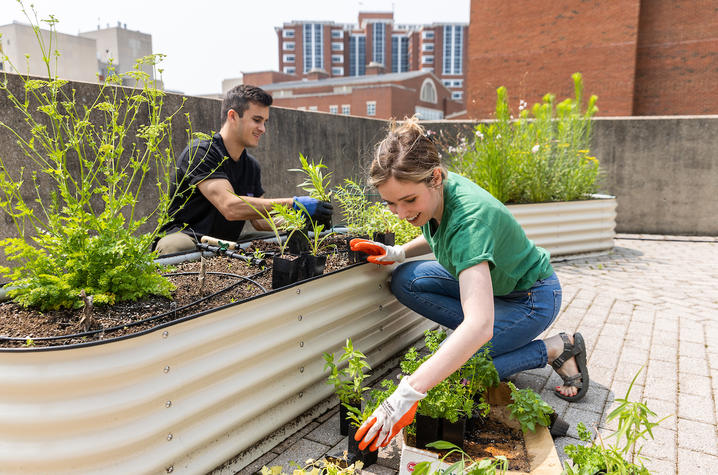Goodness is growing at the Kentucky Clinic.
University of Kentucky College of Medicine student Mara Atherton was working a shift at the clinic when she noticed a couple of raised planters on the patio. As an avid gardener herself, they piqued her curiosity.
“The patio had great sunlight and good views, it sits in the path of the monarch butterfly migration, plus it’s relatively shielded from the traffic noise on Limestone,” said Atherton. “It was peaceful to me, so I wanted to make it a little more special to share it with other people.”
From that point on, the idea blossomed into a community service project among other medical students, providers and advisors. The objective of the group was to create a focal point for patient education, for general wellness and for addressing food insecurity in the Lexington community.
Students from several different organizations have been able to contribute to growing the garden. It is primarily run by Atherton and several other students from the Gold Humanism Honor Society (GHHS). They have also coordinated with the student interest group Chef Med, and with student officers from the Nutrition Clinic at the Salvation Army, both within the UK College of Medicine.
With medical school comes responsibility and stress. Atherton said there were already students looking for an opportunity to get involved in something outside of class.
“I thought the project seemed feasible, so I decided to take a shot at making it a reality,” said Atherton. “And wow, it was so rewarding to see people have a good time helping out on our first planting day.”
As students continued to maintain the garden, they started to realize its multiple uses. While it provided them with community building and stress relief, how could they use it to help their patients?
“We wanted it to reflect our roots in medicine and ultimately help patients make better lifestyle dietary choices,” said Atherton. “We agreed we wanted some kind of patient education accompanying the garden.”
Today, the space provides comfort and peace to patients and their providers on hard days, as well as allowing medical students to advocate for food-insecure patients. Now, future generations of UK medical students will have the potential to make this community service project their own.
“Food insecurity is a problem affecting at least one of all our patients,” said Atherton. “As future physicians, it’s important that medical students understand this affects all of us.”
